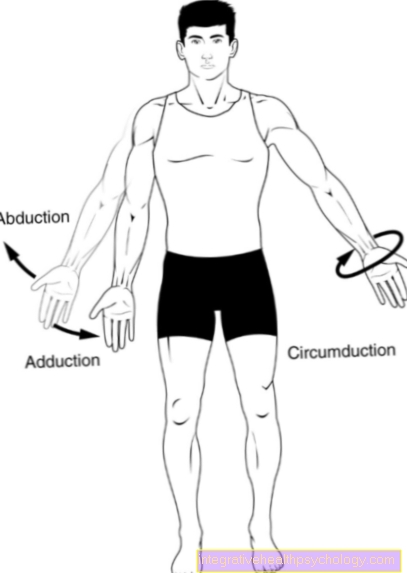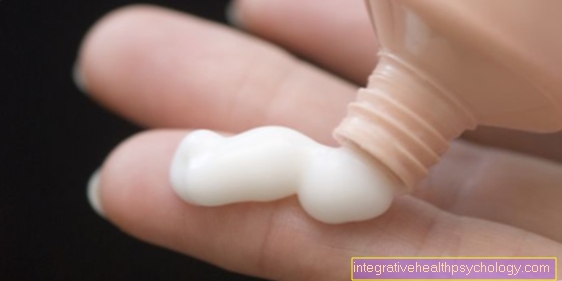Chronic gastritis
introduction
The chronic gastritis is a Inflammation of the lining of the stomachwhich occurs especially in middle-aged people.
This inflammation lasts for a long time, sometimes for years, and causes permanent changes in certain cells in the lining of the stomach. In contrast to acute gastritis, chronic gastritis shows up frequently at the beginning no symptomswhich is why it often goes unnoticed. If symptoms occur, they can resemble those of acute gastric mucosal inflammation. Most of the time, however, they are very unspecific. Despite the minor complaints, there is one Treatment very importantin order to avoid late damage.
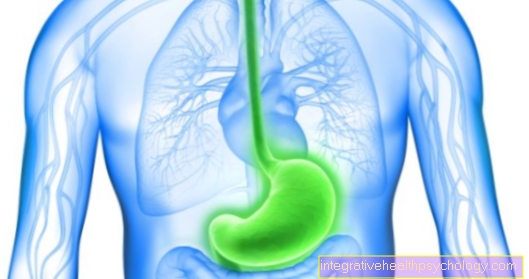
Chronic gastritis can be broken down into different shapes (Type A, B or C gastritis), depending on what causes it. There are also some special forms of chronic gastric mucosal inflammation.
The diagnosis of chronic gastritis is made by a Gastroscopy secured with a biopsy. A so-called gastroscope, i.e. a thin tube with a camera at the end, is pushed through the esophagus into the stomach in order to be able to assess the gastric mucosa. At the same time, a tissue sample (biopsy), which is examined by pathologists in order to identify changes in the mucous membrane and any triggers.
There are also other tests that can be used to diagnose gastritis. Depending on the cause, certain bacteria, antigens, antibodies or autoantibodies can be detected in the stool or blood.
The Cells the lining of the stomach change in the context of chronic gastritis and in the worst case can degenerate into gastric carcinoma. That is why they are found in people with chronic gastritis regular checks very important in order to be able to recognize and treat cancer at an early stage.
causes
The causes for chronic gastritis differ and lead to different types of gastric mucosal inflammation. You will be in the Types A, B. and C. divided. There are also some special forms.
- Type A gastritis is based on a defect in the body's immune system. It is an autoimmune disease in which the body produces antibodies against what are known as Parietal cells are directed. These cells are located in the stomach lining and are responsible for the production of stomach acid and the so-called Intrinsic Factors responsible.
- Type B gastritis is caused by bacteria of the genus Helicobacter pylori. These can be transmitted through spit or stool and often linger unnoticed in the stomach for years. There they penetrate the top layer of the mucous membrane and can thus survive despite the aggressive stomach acid, as they neutralize it. These bacteria can lead to ulcers in the stomach and duodenum.
- Type C gastritis is triggered by chemical stimuli. These include above all certain drugs from the group of non-steroidal anti-inflammatory drugs (NSAIDs). These are, for example, acetylsalicylic acid (ASA, Aspirin®), Ibuprofen® and Diclofenac®. These drugs attack the lining of the stomach and can damage the lining if taken for a long time. Another cause can be bile, which flows back from the duodenum into the stomach (gall reflux) and there leads to irritation of the gastric mucosa. This is particularly common after gastric surgery.
In addition to these three types, there are also special forms of chronic gastritis. You can for example in the context of chronic bowel disease Crohn's disease occur.
Caused by stress
An inflammation of the stomach lining can result too much stress arise or be entertained. The inflammation of the mucous membranes can also develop into a stomach ulcer due to stress. This carries the risk of bleeding and often causes symptoms such as abdominal pain, nausea, bloating and loss of appetite. If this happens, a doctor should be consulted.
The basic rules also apply to gastritis that is mainly caused by stress: light food, avoidance of fatty or spicy foods, no alcohol but warm tea or non-carbonated water, no consumption of coffee and nicotine. If possible, pain relievers such as ibuprofen or diclofenac should also be avoided. In addition, of course: stress reduction as much as possible.
Symptoms
First of all, caused a chronic gastritis often no complaints. This is because it develops slowly over several years. Therefore, the disease often goes unnoticed for a long time.
At most, one can occasionally Bloating or Flatulence occur that are usually not immediately associated with inflammation of the gastric mucosa.
When symptoms occur, they are often similar to symptoms of acute gastric mucosal inflammation.
There are unspecific complaints in the upper abdomen, such as an increased feeling of pressure or Pain. The flatulence may increase and diarrhea may occur. Also heartburn, nausea and Vomit are among the possible symptoms. Also indicates Bad breath indicate that there is something wrong with the stomach. This occurs mainly with type B gastritis. In very advanced stages it can become too Blood in the stool come, which makes itself recognizable by so-called tarry stool, i.e. black-colored stool. Vomiting of white blood can also indicate inflammation of the gastric mucous membrane with severe injuries to the mucous membrane, but this is rarely seen.
Depending on the type of chronic gastritis, the symptoms can vary. In the Type A gastritis In addition to the typical stomach problems, the symptoms of a pernicious anemia, so an anemia occur. These include tiredness, reduced performance, yellowing of the skin and, in the further course, neurological failures.
A Type C gastritis usually causes very unspecific complaintsthat too on one Irritable stomach could suggest.
Is it in the course of chronic gastritis already to the emergence of Stomach ulcer come, they can make themselves felt as cramp-like, stabbing pain in the upper abdomen. This pain usually occurs after eating.
diarrhea
diarrhea is one of the symptoms that occur in both chronic and acute gastritis. Chronic gastritis usually only occurs in later course to complaints. The inflammation of the gastric mucous membrane creeps up slowly and diarrhea and other symptoms only occur when the mucous membrane has already shown significant damage. Usually it is watery diarrhea.
Classification
Chronic gastritis is classified according to the cause and is divided into three forms:
- Chronic gastritis type A
- Chronic gastritis type B
- Chronic gastritis type C
Type A gastritis
The chronic gastritis type A is also known as autoimmune gastritis designated. This means that it is triggered by antibodies that are produced by your own body. This form of chronic gastric mucosal inflammation is the rarest and accounts for about 5% of gastritis. It can be hereditary and occurs more often in people who already suffer from other autoimmune diseases, such as type I diabetes mellitus, Addison's disease or Hashimoto's thyroiditis.
The Autoantibodies, which the body forms in type A gastritis, are directed against the so-called Parietal cells of the stomach, too Parietal cells called. These are usually for that Gastric acid production responsible. Your downfall creates a shortage. As a result of the decreased secretion, the hormone gastrin is released, which is supposed to stimulate gastric acid production. However, since the parietal cells no longer function properly, the gastrin secretion does not help with acid secretion. Instead, it encourages the development of gastric tumors.
The parietal cells also produce Intrinsic factor, the one for the inclusion of Vitamin B12 from the intestine. Due to the loss of the parietal cells, there is consequently a lack of the instrinsic factor. The result is vitamin B12 anemia (pernicious anemia), as vitamin B12 is required for the production of the blood pigment.
Type B gastritis
Chronic gastric mucosal inflammation of type B represent the largest proportion of gastritis with around 80%.
It is caused by bacteria of the genus Helicobacter pylori evoked. These are spiral-shaped bacteria that can survive in the acidic environment of the stomach, in which they neutralize them in order to be able to settle there.
The gastric lining is damaged by the production of various enzymes. This type of gastritis mainly damages the area of the stomach at the transition to the gastric outlet. Helicobacter pylori can survive unnoticed in the stomach for years. Damage to the mucous membrane increases the risk of developing stomach cancer. The bacterium can be transmitted through stool or spit.
Type C gastritis
Chronic inflammation of the stomach lining from Type c is through chemical irritation of the stomach.
Which includes Bile and certain Painkiller from the group of non-steroidal anti-inflammatory drugs (NSAIDs), such as. Ibuprofen®, Diclofenac® or acetylsalicylic acid (ASA, Aspirin®). These drugs attack the protective layer of the stomach, especially if they are taken for a long time, and thus damage the gastric mucosa. This can lead to chronic type C gastritis.
Normally, the bile is passed into part of the small intestine, into the duodenum, and is used here for digestion. If the Bile however flows back into the stomach (Gall reflux), the acidic gastric environment is disturbed and it can damage the mucous membrane. Chronic gastritis can result from this. This is often the case after operations on the stomach area.
Type C gastritis accounts for around 10 to 15% of chronic gastric mucosal infections.
therapy
The therapy The chronic gastritis occurs depending on the cause.
The most common form that Type B gastritis, is triggered by bacteria and therefore with Antibiotics treated. It has proven itself a so-called Eradication therapy perform. This is a combination therapy that consists of taking two different antibiotics together with one Proton pump inhibitors consists.
By taking it for a week, the Helicobater pylori bacteria can be killed in about 90% of cases. The proton pump inhibitor is given to make the stomach environment less acidic and thus to improve the effectiveness of the antibiotics. If the therapy initiated does not prove to be effective, another combination is administered.
With a chronic Type A gastritis will mostly Vitamin B12 injections prescribed because this vitamin is very important for blood formation and can only be insufficiently absorbed from the intestine in this form of inflammation. Regular checks by the doctor, in the form of an endoscopy with the removal of a tissue sample to be examined (biopsy), are useful, as there is an increased risk of developing gastric cancer with type A gastritis.
Is the chronic gastric mucosal inflammation through chemical stimuli has been caused, so there is a Type C gastritis before, so should this omitted become. As a rule, these are certain pain-relieving drugs that should not be taken.
Is there a need for medication such as It is recommended that you take Aspirin® permanently Gastric protection preparation (such as. Proton pump inhibitors) to protect the stomach lining.
Drugs for chronic gastritis
Medicines that are used in chronic gastritis are, for example, acid inhibitors, also called proton pump inhibitors. Which includes Pantoprazole and Omeprazole. They keep that in the stomach less stomach acid is produced. However, they alone do not help to combat the root cause of chronic gastritis. This is where type B gastritis occurs, for example Antibiotics and Acid inhibitors used in combination.
They are used to treat colonization with the Helicobacter pylori bacterium. Usually it is one Triple Therapy, i.e. a therapy consisting of 3 drugs. These include the acid inhibitor Pantozol and the antibiotics clarithromycin and amoxicillin or metronidazole.
Home remedies for chronic gastritis
To cure chronic gastritis there are no home remedies. Only about the complaints to alleviate these can be used. Occasionally, warm teas that are gentle on the stomach, such as chamomile tea or mint tea, help. Soda powder dissolved in warm water and drunk slowly should also alleviate the symptoms Acute situation alleviate. It is believed that the baking soda helps neutralize stomach acid somewhat. This often leads to gastritis irritation the already overused mucous membrane, which can lead to pain and nausea.
Can chronic gastritis be cured?
A complete healing is only for chronic inflammation of the gastric mucosa of Type B and C. possible.
The bacteria that trigger type B gastritis can in most cases be through the Eradication therapy be destroyed and the chemical stimuliwhich can lead to type C gastritis Be avoided. As a result, the gastric mucosal inflammation is generally considered cured.
In the Typ A gastritis however, there is one Defects in the body's defense system that cannot be corrected.
A lifelong treatment with anti-acid drugs (Proton pump inhibitors) is necessaryso that acid production in the stomach does not become excessively high. Besides, it must Vitamin B12 can be given by injections as the body cannot absorb it by itself, but it is needed to produce blood. In addition are regular check-ups necessary because the risk of gastric cancer is increased in type A gastritis.
How can you cure chronic gastritis?
Chronic gastritis persists for a long time. One differentiates between different causes for their emergence. Therapy differs depending on the cause. To find the cause, it may be necessary to have a Gastroscopy perform.
If an autoimmune disease is the cause of the inflammation, then it is chronic gastritis type A. For this there is so far no causal therapy. In this - rare - form of gastritis, certain cells in the stomach are attacked, the parietal cells. These produce a substance that is necessary for the oral ingestion of Vitamin B12 in the body is essential. If this substance is no longer available in sufficient quantities due to gastritis, it must last for life regular syringes are fed. However, this does not cure chronic type A gastritis.
The type B gastritis is caused by a colonization with the bacterium Helicobacter pylori caused. In order to successfully treat this type of inflammation, the bacteria must be removed. One speaks of one Eradication therapy. For this purpose, several drugs are combined with one another, usually these are Antibiotics and acid inhibitors. Chronic type B gastritis usually heals up if the bacterium has been removed successfully.
Type C is created by harmful substances such as the regular use of pain relievers such as Ibuprofen. To successfully treat this type of inflammation, the triggering substances must be found Completely be omitted. Since chronic gastritis usually already exists for a longer period of time, it also takes a whileuntil the inflammation has completely healed. In general, acid-inhibiting drugs are also used in chronic gastritis, as is the case with the acute form.
Is Chronic Gastritis Contagious?
Chronic gastritis is in this sense not infectious. It is about a inflammation the lining of the stomach. In cases in which the gastritis was triggered by a colonization with the germ Helicobacter pylori, there is theoretically a low risk of the germ being transmitted from one person to another.
The exact mechanism of infection is not yet known. A colonization with the bacterium means however Not automatically that an inflammation of the stomach lining develops. There are many people who carry the germ in themselves but have an inconspicuous mucous membrane.
Duration of gastritis
Chronic gastritis often goes unnoticed for a long time. Sometimes it causes discomfort such as loss of appetite, burning / pain in the upper abdomen, or nausea. If left untreated, gastritis is chronic, so it often does not heal on its own.
If treatment is initiated, be it through medication or by leaving out triggering factors, an improvement can be achieved within Weeks to months enter.If symptoms arise, the use of acid inhibitors (for example pantoprazole) can usually relieve the symptoms relatively quickly.



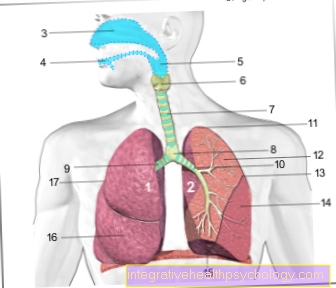



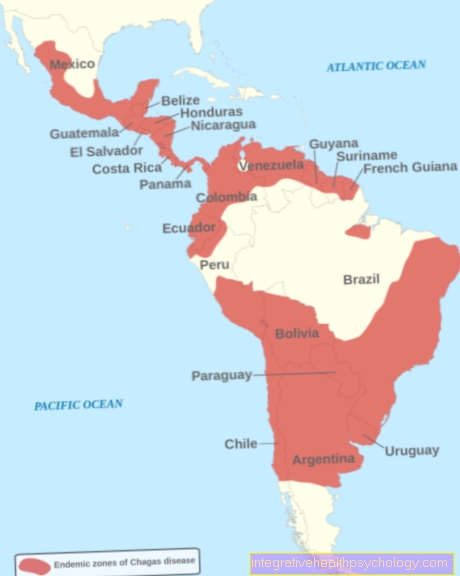
.jpg)
